'Orlando justifies my Muslim ban' says Trump
- Published
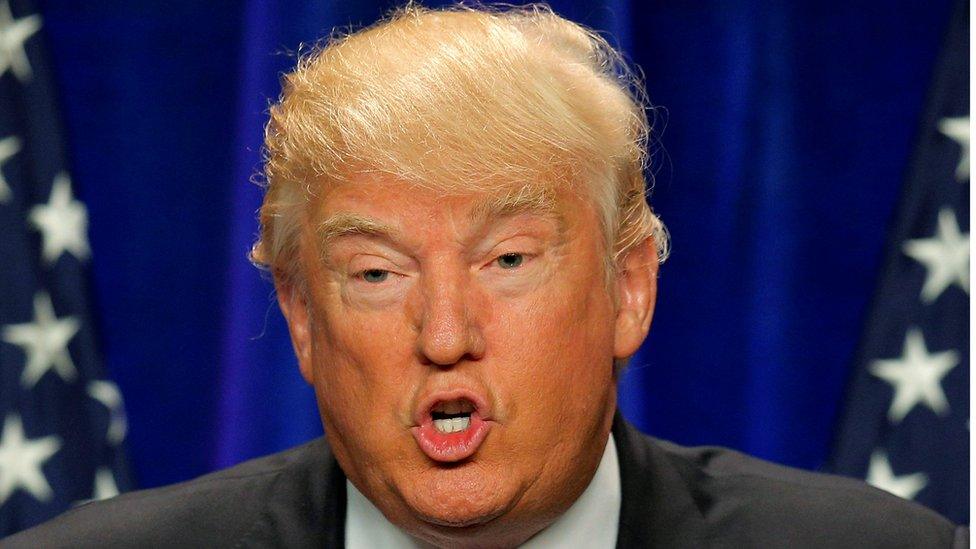
Donald Trump has run an unconventional presidential campaign up to now, so it shouldn't be any surprise at this point that his response to the Orlando shootings violated many political norms.
He quickly claimed credit for predicting such an attack. He assigned responsibility before all the bodies had been removed from the scene of the violence. And he repeated, external unconfirmed rumours and speculation with apparent disregard for their source.
According to reports, officials within the Republican Party had advised Mr Trump to offer his condolences following the Orlando shootings and then remain silent. He obviously opted for another course.
Police deny false claims of 'multiple gunmen'
Orlando shooting: Special report
After more than 24 hours of heated rhetoric Mr Trump took the stage at a New Hampshire college to deliver what was billed as a major policy speech on immigration and the Orlando attacks. As he quickly noted, he originally had intended to talk about "all the bad things" that his presumptive Democratic opponent, Hillary Clinton, has done.
Instead, he spoke about all the bad things he sees in current US immigration and counter-terrorism policy.
Here are five key lines from his speech - and what they could mean.

A better, bigger Trojan horse
"When I am elected, I will suspend immigration from areas of the world when there is a proven history of terrorism against the United States, Europe or our allies, until we understand how to end these threats."
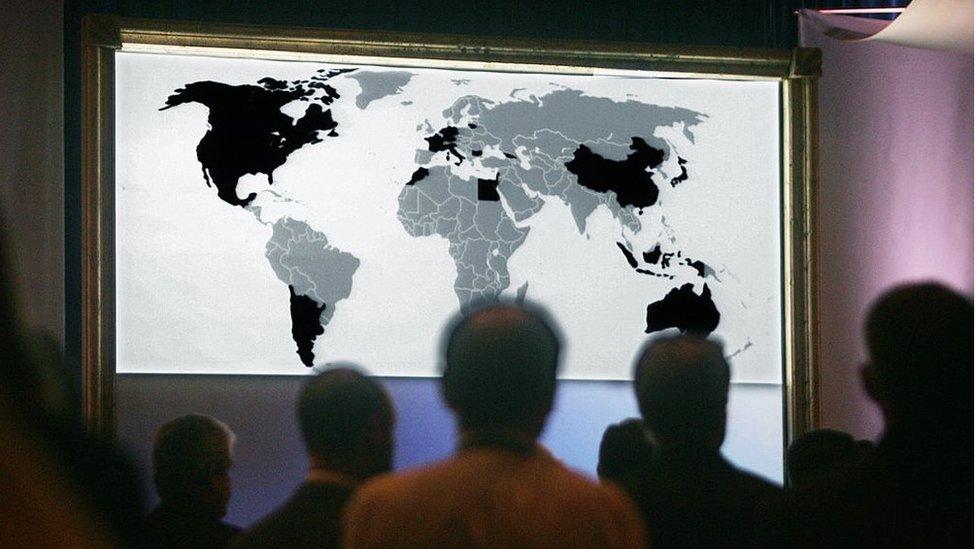
It is unclear which countries would be on Trump's list.
On Monday Mr Trump provided some additional details about the temporary Muslim ban that he proposed (or "suggested", depending on when you ask him) following the San Bernardino shootings in December.
First of all, it may not be a Muslim ban at this point. In his speech he simply referred to closing the borders to nations that "have a history of terrorism" against the US and its allies - which could be a very wide swath of the globe, depending on how far back the ban goes and what countries are considered allies.
Does it include Somalia? Probably. Saudi Arabia? Perhaps. Pakistan? Ireland? "Terrorism" has quite a long history.
Mr Trump said his proposal could be implemented through unilateral executive action, given the president's power to "suspend entry into the country of any class of persons that the president deems detrimental to the interests or security of the United States".
He also outlined the conditions for lifting the ban - following a "security assessment" and after a "responsible immigration policy" has been implemented.
The crux of the problem, according to Mr Trump, is that "hundreds of thousands" of immigrants are entering the US without proper background checks and, once they're here, some of them are becoming militants and, it seems, "trying to take over our children and convince them how wonderful ISIS is and how wonderful Islam is".
He noted that the Orlando shooter's parents were from Afghanistan and that the US must do something to prevent the radicalisation of the children of immigrants.
This once again goes back to the heart of Mr Trump's critique of US immigration policy - that it has been failing for years, if not decades. The fact that Omar Mateen is a US citizen, born of Afghan immigrants who came into the US in the 1980s is just a reflection of a system, he says, that needs a total overhaul.
Side note: Donald Trump is the child of an immigrant.

Co-operation and surveillance
"The Muslim community ... they have to co-operate with law enforcement and turn in the people who they know are bad. They know it."
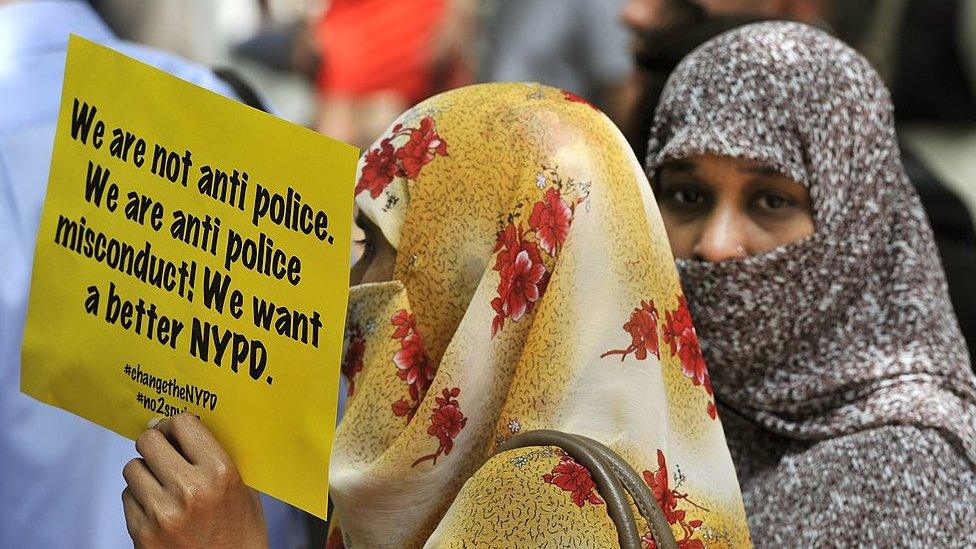
Surveillance of mosques in New York several years ago prompted protests and a rethink by police
Mr Trump has repeatedly asserted that members of the American Muslim community are, in part, responsible for reporting the militants in their midst. If someone has information about an impending attack and does nothing, he said, they need to be "brought to justice".
Earlier on Monday Mr Trump said the US has to be "very strong in terms of looking at mosques", and during his Monday speech called for increased co-operation between "state, local and federal officials".
"I will have an attorney general, a director of national intelligence and a secretary of defence who will know how to fight the war on radical Islamic terrorism - and they will have the support that they need to get the job done right, not like it is right now," he said.
In some ways Mr Trump's proposals - increased funding for intelligence agencies, greater co-ordination between government agencies, defeating the so-called Islamic State overseas - sound similar to what Mrs Clinton and President Barack Obama have proposed.
Mr Trump's implicit critique, however, is that what the Democratic administration is doing isn't working.
"This is just the beginning," he tweeted, external ominously on Sunday.
Side note: There's still five months until election day.

Politically incorrect
"That is the choice I put before the American people: A mainstream immigration policy designed to benefit America, or Hillary Clinton's radical immigration policy designed to benefit politically-correct special interests."
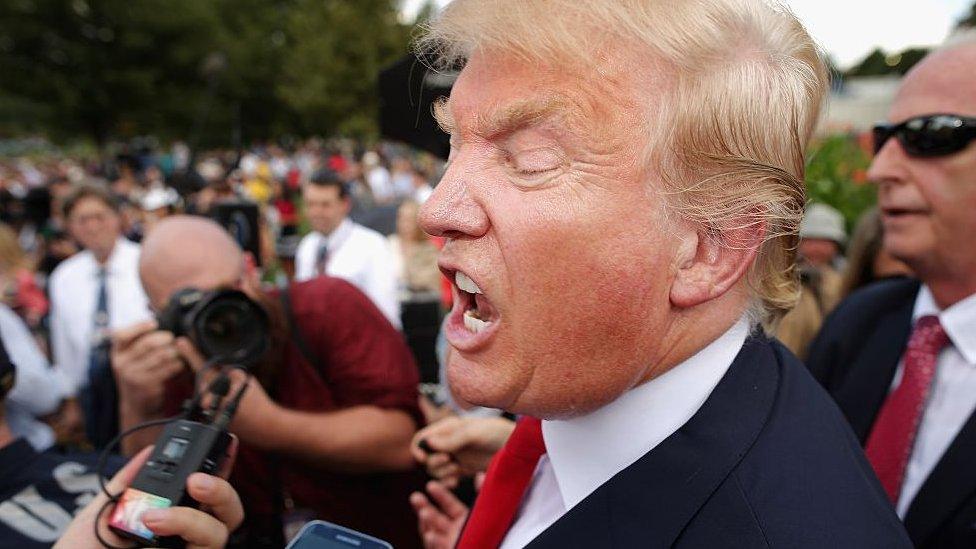
The presumptive nominee is not afraid to speak his mind
Throughout his campaign Mr Trump has said that "politically correct" views are corrupting US policy.
"I think the big problem this country has is being politically correct," he said in the first Republican debate last August. "I've been challenged by so many people and I don't, frankly, have time for total political correctness. And to be honest with you, this country doesn't have time, either."
In the context of foreign policy, Mr Trump sees politically correctness as keeping the US from targeting militants, and their families, overseas. It limits the ways the US can interrogate prisoners. It prevents law enforcement from singling out groups that are likely to present a greater threat.
"We need to respond to this attack on America as one united people - with force, purpose and determination," Mr Trump said on Monday. "But the current politically correct response cripples our ability to talk and think and act clearly."
Political correctness, Mr Trump asserts, also leads to an immigration policy that allows "special interests" to dictate who can enter the country and in what numbers.
What do those nefarious special interests want? More Muslim immigrants? More Democratic-voting constituencies, perhaps? Mr Trump leaves those details unstated.
He said the Obama administration has put political correctness "above common sense, above your safety, above all else".
Mr Trump styles his straight talk as an antidote to the carefully crafted, audience-aware statements of traditional politicians. It turns his apparent verbal missteps into strengths, his blunt talk into a willingness to speak uncomfortable truths.
Side note: We don't know yet whether the larger American electorate will embrace Mr Trump's unscripted proclivities with as much joy as Republican primary voters.

Bad guys having fun with guns
"I will be meeting with the NRA, which has given me their earliest endorsement in a presidential race, to discuss how to ensure Americans have the means to protect themselves in this age of terror."
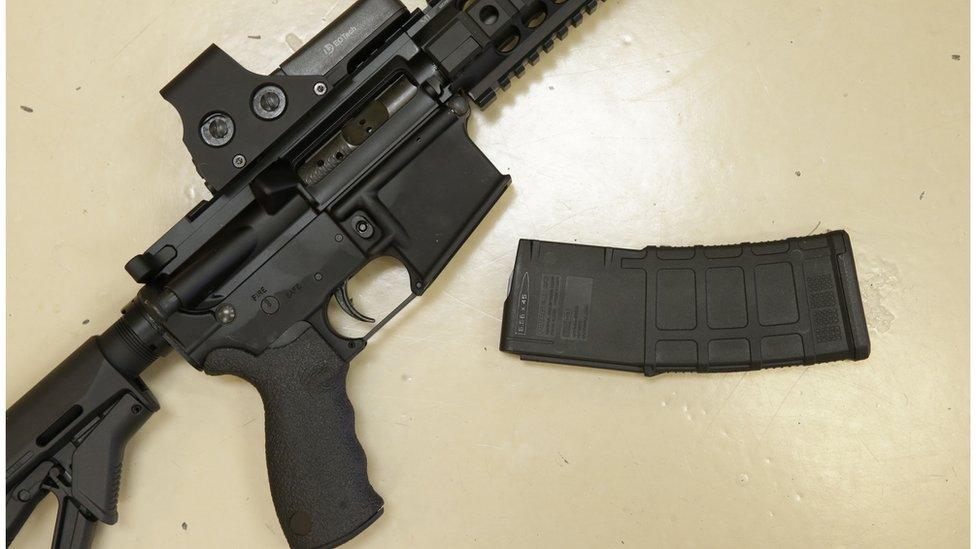
Republicans have blocked Democratic attempts to ban assault rifles
Earlier on Monday Mrs Clinton identified firearm regulation as an important part of the US response to the threat militant attacks from home-grown militants. Framing gun control as a national security issue, she said that "weapons of war have no place on our streets".
Although Mr Trump has had a history of being in favour of some limits on firearm purchases, including a ban on military-style semi-automatic rifles, he currently takes a hard line against any further regulation.
He has accused Mrs Clinton of wanting to "abolish" the Second Amendment constitutional protection of the right to bear arms. And, on Monday, he went so far as to draw a connection between Mrs Clinton's views on immigration and her stance on gun control.
"She wants to take away American's guns and then admit the very people who want to slaughter us," Mr Trump said. "Let them come into the country, we don't have guns. Let them come in, let them have all the fun they want."
Mr Trump, with his line about meeting with the National Rifle Association, seems to be endorsing the view that more weapons, not fewer, is the key to the security of the American people. Ever since the days after the Paris attacks he has said that the outcome would have been different if Parisians had been armed and "bullets had been going the other way".
He mentioned France again on Monday, noting the nation's strict gun laws didn't stop 130 people from being "brutally murdered by Islamic terrorists in cold blood".
Side note: Florida has permissive gun laws and there was an armed security guard at the Orlando nightclub.

Protecting the LGBT community
"The burden is on Hillary Clinton to tell us why we should admit anyone into our country who supports violence of any kind against gay and lesbian Americans."
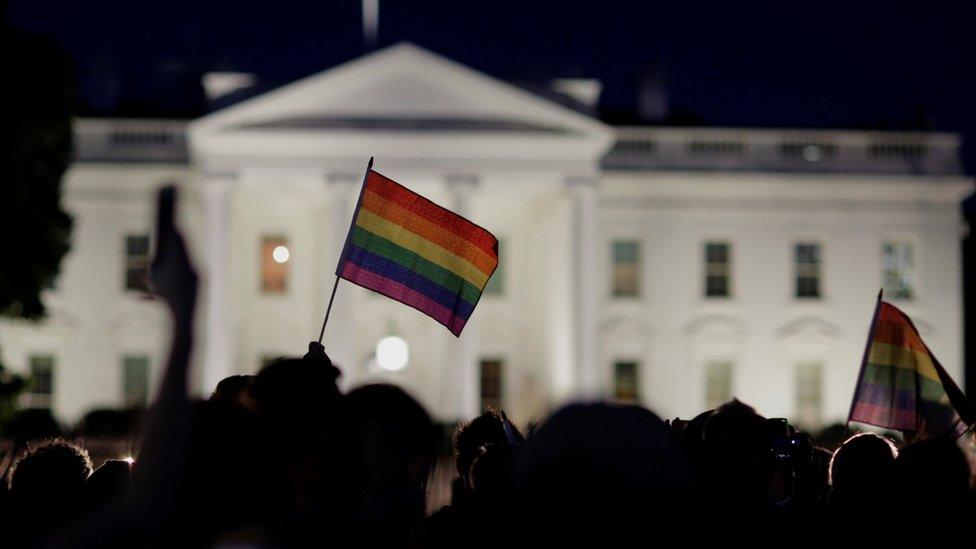
Mr Trump said the LGBT community would have a friend in the White House if he wins.
Buried underneath Mr Trump's talk of immigration bans, militants on American shores, dangerous political correctness and a vulnerably disarmed public was his repeated attempts to position himself as the defender of the safety of the LGBT community.
By targeting a gay nightclub, he said, Mateen struck "at the heart and soul of who we are as a nation".
"It's an assault on the ability of free people to live their lives, love who they want, and express their identity," Mr Trump said. "It's an attack on the right of every single American to live in peace and safety in their own country."
Mrs Clinton couldn't claim to be a "friend of the gay community", he said, while supporting immigration policies that bring "Islamic extremists" into the US.
Some media pundits noted on Sunday that Republican politicians have tended to brush over the fact that that the Orlando attacker specifically targeted gays.
"Republicans' silence is actually quite apt," writes, external Slate's Mark Joseph Stern. "As a party, after all, the GOP has spent decades attempting to degrade sexual minorities and even drive them out of public life. It is altogether fitting, then, that conservative politicians are erasing LGBTQ people from their own tragedy."
That may be the case - and Mr Trump may be embracing the community for specific political ends - but on Monday he did not ignore them.
Side note: Nearly all of the casualties in Orlando were Hispanic. What will Mr Trump do with that information?

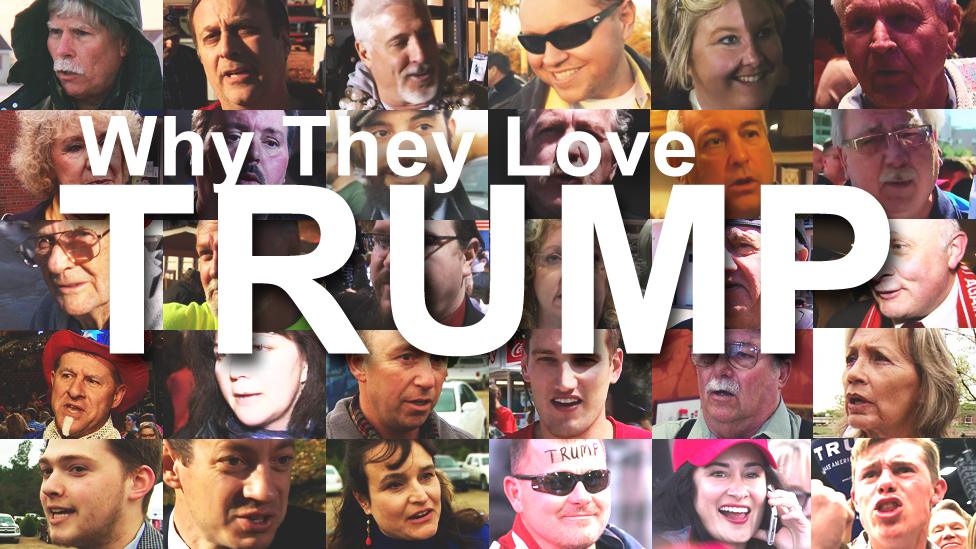
- Published13 June 2016
- Published6 June 2016
- Published18 May 2016